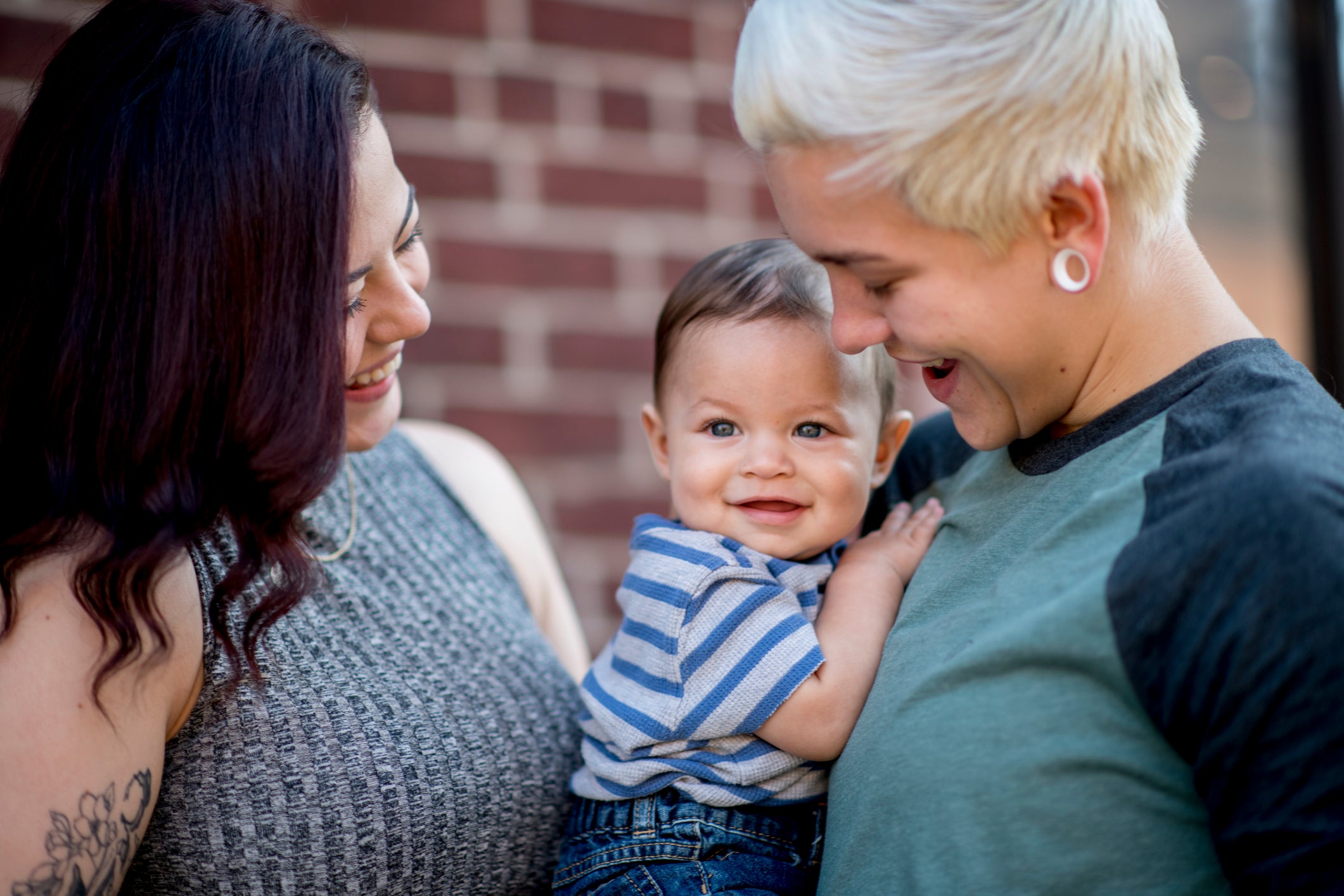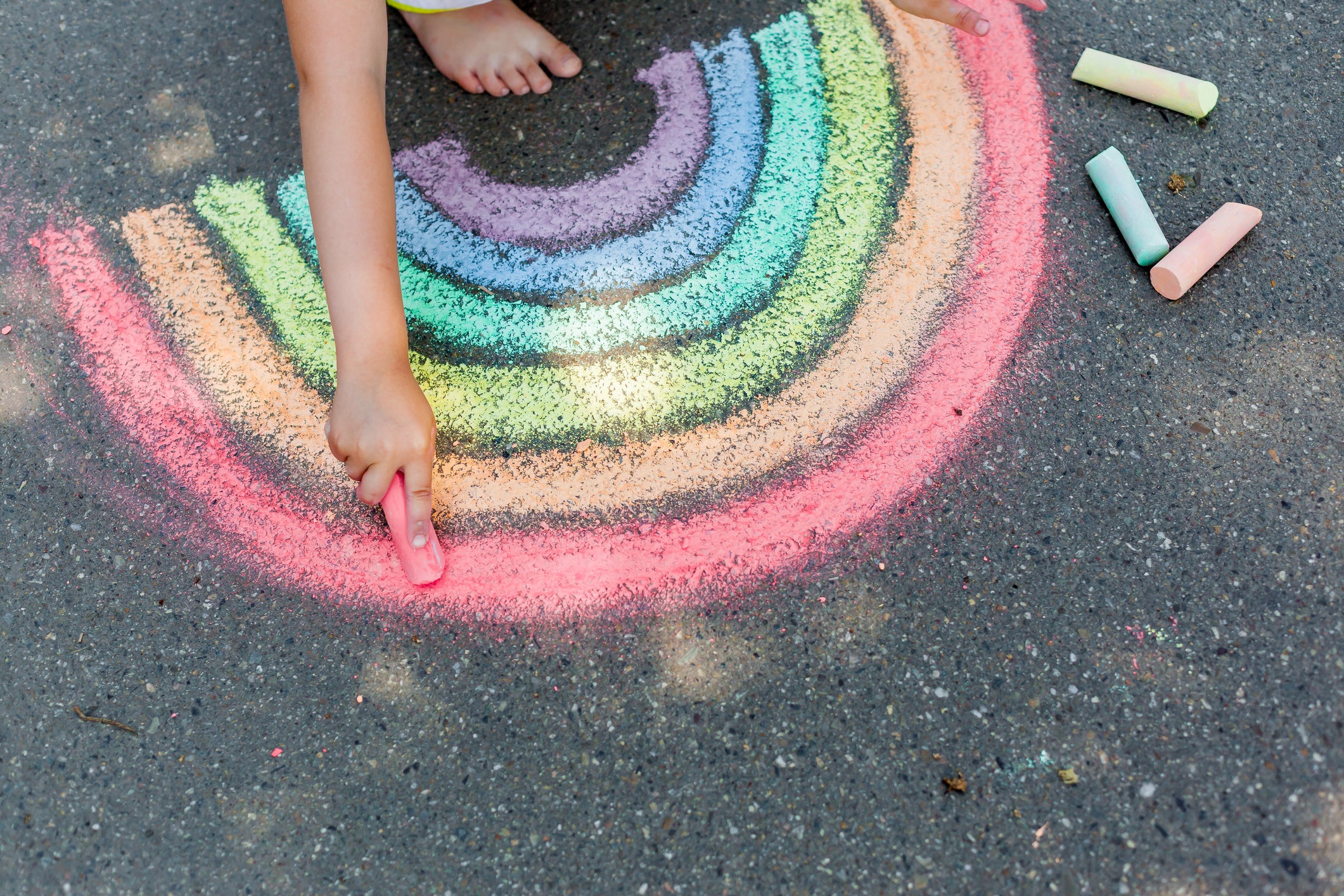‘Your dad is more of a Wonder Woman than a Superman’: How to come out to your children
It’s the sort of conversation a child usually plans to have with their parents, but sometimes it’s the other way round. Lauren Rowello gives her advice for coming out to your family

The toddler-size chair at the wooden table in my five-year-old's playroom sits just a few inches off the ground. My knees poke up into my chest, and I hug my arms tightly around my legs as Ben stacks blocks to make a tower on the rug.
My spouse, a transgender woman not yet out to our community, family or the rest of the world, has spent 10 or so awkward minutes fidgeting and fumbling through a coming out speech we had prepared for our kid. It's the kind of announcement queer kids might typically plan for their parents – but we found ourselves in a reversed situation.
I check in with Ben about his feelings and tell him that he can come to me with any concerns or questions. After a pause, he finally asks, “Will Dad still be able to play baseball with me?”
A laugh escapes as tension melts from my body, and I am relieved that his only question has a simple and obvious answer.
Danna Bodenheimer, a therapist who specialises in the care of LGBT+ people and their families at Philadelphia's Walnut Psychotherapy Centre, says that although parents often worry about their children's reactions during the coming out process, she has never seen a child respond poorly. “Children don't have expectations about who their parents should be. They just want their parents to be healthy. They think: ‘If you're going to live and be able to love me and take care of me, that's the outcome I need.’ ”
Chloe Harris came out as trans to her son when he was about the same age as Ben. “I didn't feel like I needed to talk to him about who I was dating, but when I was going to change physically in front of him, I wanted to brace him for that.” She adds, “I know that it's easier for kids to wrap their heads around a topic when the examples are familiar. One day, I sat down with my son and explained, 'Your dad is more of a Wonder Woman than a Superman'. He got that. He understood. The language made sense to him.”
Bodenheimer says to frame coming-out conversations around the idea that we're deepening an understanding about each other, avoid the word “secret” or “hiding” to describe feelings and experiences. Instead, shift to language that highlights privacy and sharing. She says to tell kids that we all have private conversations “with ourselves, and it takes time to learn and understand our own truths. Sometimes it's important for us to share [what we've learned] outwardly and it doesn't feel as good to keep it private anymore.”

She adds that if a child is surprised or hurt or asks probing questions, it's important to legitimise their reactions and feelings. Harris says her young child asked if her gender transition would mean that he'd also have to become a girl when he gets older. She wasn't prepared for that comment but responded with empathy. “Of course not, because this isn't about you changing. I'm just changing and you are whoever you are.”
Kids might be interested in discussing how or whether they'll tell their friends or leaders at school or in the community. If a parent is pursuing a gender transition, they might also ask if medication will be needed or a doctor will be involved.
Bodenheimer says parents should allow children to say whatever comes to mind in the moment and let kids know this isn't the only time the family will talk about this topic. “It takes time for the brain to absorb,” Bodenheimer says. “This might not make sense to kids at first. They might have more or different questions over time.”
“If a parent is trans or nonbinary, discuss names and pronouns. There was a moment for me when I didn't want to be called Dad,” Harris says. “I wanted to be Mom, but I wanted to let him come around on his own to that idea.” Her son continues to use the language he’d grown up with and now typically uses her first name while they're in public and Mom or Dad at home.” All of those are OK with me because they feel right for him.” Other families should make the decisions that are right for them but be gentle with kids who need reminders.
I think there’s a myth that in more liberal or progressive spaces that it’s safe or there’s less risk. There’s been progress, but it’s not a real liberation
Children might want to know whether or how the family will evolve – including if a divorce or move from the household is impending. Kids should be offered honesty, and it's better to explain that adults aren't sure how the household will shift if they aren't certain. Some parents will split up if they no longer view themselves as compatible – but Bodenheimer says children should understand that the revelation itself is not wrong, bad or even the cause of fragmentation, and that queer identity isn't problematic.
Older children and teens might feel pressured to emotionally support their parents during this time. Bodenheimer explains parents should tell kids who are concerned about their parents' wellbeing that they've given this a lot of thought and have the support and resources they need, supporting kids rather than seeking support from kids.
It's also helpful to know that many children have an inkling about their parent's identity before that parent even reveals anything. When Katie Alte's child was in second grade, he started a conversation with his parent about what it means to be gay and the stereotypes that surround queer experiences. During the conversation, he exclaimed, “Mum, you're gay!” This was before Alte even completely understood their own queer identity.
Bodenheimer notes that parents who are considering coming out often worry about how society's perceptions will impact their children. “I think there's a myth that in more liberal or progressive spaces that it's safe or there's less risk. There's been progress that we have language and some acceptance, but it's not a real liberation.”

Alte explains that their own mother initially said she would no longer like to have contact when they announced their relationship and that family friends didn't want their children to meet their husband, a queer trans man. Alte adds, “Most of them have since 'come around', as they say, but the sting of those types of rejections lingers in relationships – and how we are out to our children is certainly affected by that.”
Some children could have concerns about personal safety if they've witnessed bigotry or understand its threat. Bodenheimer says kids might feel scared, embarrassed or anxious about how peers will react and notes the importance of finding support and queer community where families can safely and freely express themselves.
Some parents aren't preparing their children for shifts in appearance, family dynamics or societal perceptions when they come out, but it's still important to share their authenticity with their children. Minna Dubin says invisibility is a concern for couples in relationships that appear to be cisnormative and heteronormative. She is a cisgender woman married to a cisgender man. “If it's two people who are both the same gender, no one needs to come out because the culture of the family is more obvious from day one. I can feel very unseen for who I actually am.”
Children don’t have expectations about who their parents should be. They just want their parents to be healthy
When her son was five, Dubin pointed to the LGBT+ centre that they regularly passed in the car and explained that the building is a safe space that protects those with diverse experiences of sexuality and gender, including women who love women and men who love men. Her son replied, “You love men because you love Daddy,” to which she added, “I do, but I also love women.”
Dubin says her child simply smiled at her in the rearview mirror and nodded, “You love both,” which was affirming to hear. “The older I get, the more important it feels like part of my identity – so much so that not telling people starts to feel bad, like I'm hiding it.”
Bodenheimer says it is inherently traumatising to be queer in a cisnormative and heteronormative world. Even if families continue to feel silenced or invisible to the outside world, she says being authentic with our children is still important. “I think the opportunity to say more about who you are is life-changing and transformative and changes a whole family unit. Not saying something also impacts the whole family unit, too, so this is moving into more honest ways of being together,” she said.
Recently, I checked in with Ben, who is now 10 years old. My spouse is in a more active stage of transitioning – expressing herself in a more feminine way and using hormone therapy to change her body's appearance. Ben said, “I'm just happy for her. It's so good that she gets to be herself.”
He mentions the coming out process has created an atmosphere in our home that is open, caring and accepting. “You guys talk about things that people don't like to talk about and always make sure everyone is safe and OK. Even if we feel nervous or uncomfortable to talk about something, we still do it because we need to.”
He says this demonstrates to his friends that it's OK to have important conversations and express emotions together. “It creates space for everyone to be able to get stuff off their chest so that everyone can feel safer around each other.”
I'll take it.
© The Washington Post
Subscribe to Independent Premium to bookmark this article
Want to bookmark your favourite articles and stories to read or reference later? Start your Independent Premium subscription today.





Join our commenting forum
Join thought-provoking conversations, follow other Independent readers and see their replies
Comments